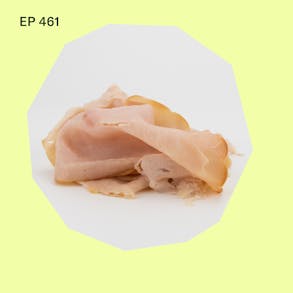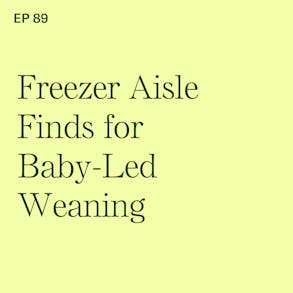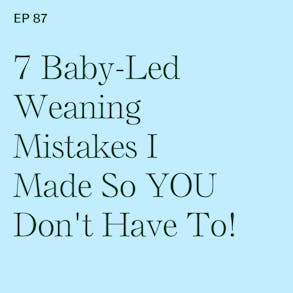Are Deli Meats Safe for My Baby to Eat?
- How the texture and nutrient profile of deli meats differs…and which ones to avoid
- Why deli meats are susceptible to foodborne illness…and how to reduce your baby’s risk
- Which preparation methods of whole cut meats you can swap for turkey, ham and roast beef

LISTEN TO THIS EPISODE
Episode Description
Can babies eat lunch meat? In this episode we’ll look at deli meats and explore whether cold cuts like turkey, ham, roast beef or salami are safe for your baby to eat.

Links from this Episode
- How to make a whole chicken for baby-led weaning: Cheap Protein to Cook for Your Baby in 30 Mins | Step-by-Step Instructions
- Baby-Led Weaning with Katie Ferraro program with the 100 First Foods™ Daily Meal Plan, join here: https://babyledweaning.co/program
- Baby-Led Weaning for Beginners free online workshop with 100 First Foods™ list to all attendees, register here: https://babyledweaning.co/baby-led-weaning-for-beginners
Other Episode Related to this Topic
- Episode 193 - Protein: How Much Protein Does My Baby Need?
- Episode 19 - Meat: How to Prepare Meat Safely for Baby-Led Weaning
- Episode 383 - Beef: How to Safely Offer Beef to Babies
- Episode 33 - Salt: 3 Easy Ways To Minimize Sodium For Your Baby
Resources & Research
- Agarwal, Sanjiv et al. “Association of lunch meat consumption with nutrient intake, diet quality and health risk factors in U.S. children and adults: NHANES 2007-2010.” Nutrition journal vol. 14 128. 30 Dec. 2015, doi:10.1186/s12937-015-0118-9
- CDC About Listeria infection: https://www.cdc.gov/listeria/about/?CDC_AAref_Val=https://www.cdc.gov/listeria/faq.html

Latest Episodes






Factor (1s):
I know you are super busy with your beautiful baby, and if you also have bigger kids and they play sports, then you're probably feeling my pain right now of the crazy kids sports schedules. It's the driving to practice and the games and then driving back when they forgot their shin cards or their mouth cards. It does not leave very much time for healthy food preparation for you or me, the primary caregiver of these small people. That's why I've been really leaning into factors. No prep, no mess meals to keep me fueled during this crazy season of life. Factor has 35 different meals with more than 60 add-ons to choose from. Every week. There are six meal preferences to support your wellness goals, whether that's protein plus calorie smart or keto factors, fresh, never frozen meals are dietitian approved and they're ready to eat in just two minutes. So no matter how busy you are, you'll always have time to enjoy nutritious great tasting meals. Make today the day you kickstart a new healthy routine, what are you waiting for? Head to factor meals.com/weaning50 and use code weaning50 to get 50% off your first Vox plus 20% off your next month. That's code weaning50, WEANING, the number50 at factormeals.com/weaning50 to get 50% off your first box plus 20% off your next month while your subscription is active.
Uni Love (1m 25s):
If you feed your baby outside of your house, let's say you travel or you're going to grandma's house, then you're probably going to need a portable highchair. The problem is most portable highchair aren't safe because you can't adjust the baby seat up and down to get their feet resting flat on a solid foot plate. So this has been an ongoing problem with the portable high chairs because they haven't had that ability until now. I finally found a portable highchair that checks all of the safety boxes. It's called the Feed Me three in one Portable Booster. It's made by the brand Unlove. I met the UN Love co-founder ton at an event recently. He totally sold me on their Feed Me portable booster because he showed me the four different levels that this seat height adjusts to so it grows along with your baby. So now I've been using this portable booster when I'm traveling to feed babies. I absolutely love the design. You can set it up and break it down. Literally in like 10 seconds, it folds down flat. Has a very convenient travel case. It has this great removable tray liner for easy cleanup, and it's the only affordable portable high chair with that adjustable seat height. To ensure a safe swallow right now, you can get 20% off the shadow gray color in the Uni Love Feed me portable booster when you use the affiliate discount code BLW feed me now through September 1st. This 20% off sale, it's valid only on that shadow gray cushion color, which is very moderate, very beautiful, and you can take advantage of this sale using the code BLW. Feed me. If you head to uni love baby.com, that's UNI love baby.com. Now through September 1st, enter the code B lw, feed me at checkout and you'll get 20% off the feed me three in one dining booster set from Uni love. And you can finally leave your house and feed your baby safely.
Katie Ferraro (3m 14s):
And even if you look at the Turkey offering from this very well known national brand that says it has 46% less sodium, there's still, if you drill down and look at the nutrition facts of that in a two ounce serving, there's still 360 milligrams of sodium. So if we compare that to the fact that in general, if you're offering a food to your baby that's coming out of a package, I like to see it at less than a hundred milligrams of sodium per serving. 360 milligrams is still way too much Salt. And that's from like a quote unquote, like really lower sodium deli meat product. Hey there, I'm Katie Ferraro, registered dietitian, college nutrition professor and mom of seven specializing in Baby-Led Weaning. Here on the Baby-Led Weaning with Katie Ferraro podcast.
Katie Ferraro (3m 55s):
I help you strip out all of the noise and nonsense about feeding, giving you the confidence and knowledge you need to give your baby a safe start to solid foods using Baby-Led Weaning. When it comes to protein, there are some parents who say, Katie, I'm just out of ideas. I have no clue how to make sure my baby's getting enough. Protein, they know about the benefits of offering a variety of foods, but they worry about the protein. And so if your family eats animal foods or maybe you eat meat but you don't love cooking it, a lot of times they'll default to deli meat. Lots of questions and lots of curiosity around deli meat. And so In, this episode we're going to take a look at deli meats, things like ham and Turkey roast, beef, pastrami bologna, and look a little bit closer into whether or not these are safe for your baby to eat.
Katie Ferraro (4m 46s):
I like to start out each of these solo training episodes with a Baby-Led Weaning tip of the day. Today's tip is, please do not stress about how much protein your baby is getting as adults, especially adults who are functioning or trying to function. In Western food culture, we tend to put way too much emphasis on protein. It gets an undeserved, what we call nutrition health halo. Okay? There is not a public health crisis of babies crawling around who are deficient in protein, okay? When you offer your baby a variety of foods, they're naturally going to be picking up a few grams of protein here and there. And you might be surprised to learn how few grams of protein your baby actually needs to be eating from solid foods.
Katie Ferraro (5m 32s):
If you want to learn more about the specifics of orotein needs, you can go back to episode 193. It was called Protein: How Much Protein Does My Baby Need. If you wanna check that one out for more detail. But don don't want you coming into this episode, I'll worry that your baby is not going to be getting enough protein and that you need to be frantically searching around for ways for your baby to eat protein because you don't. But hang tight, because in this episode I'll be going through three of the most popular types of deli meat, and then offering you non-processed options on how you can prepare that same type of protein food for your baby if you do decide to steer clear of the deli meat aisle. So in this episode, I wanna cover what types of deli meats are most commonly consumed, which nutrients and preservatives are in those?
Katie Ferraro (6m 18s):
And then whether or not those are okay for babies, I wanna talk about some potential health drawbacks from over-reliance on or consumption of a lot or high levels of these foods. And then offer you some suggestions on how to offer protein in a less processed way that's more appropriate for your baby's age and stage when you're starting solid foods. So let's get started by looking at the types of deli meat and just start out by defining what is deli meat. So deli meat is sometimes called lunch meats. They're pre-cooked or cured meats. So these foods are usually sliced and they're used in sandwiches or as salad toppings. And lunch meats are also referred to as deli meat, or sometimes you hear 'em called cold cuts.
Katie Ferraro (6m 58s):
And generally there are three types of lunch meats. So we'll start first with the whole cut. So whole cut is when there's a section of a whole muscle of an animal that is cooked and then flavored or spiced and then sliced. So we're talking about something like roast Beef or corn Beef, which you might eat around St Patrick's Day if you're celebrating that holiday, for example. The second category of deli meats are sectioned or formed meats. So these are meat trimmings or flakes that are bound together to form restructured meat products. So think like the multi-part, you know, Turkey breast products or cooked ham products that you might see at the store. The third category are processed meats. So that's the fine or coarsely, ground meat products such as sausages or emulsified products like bologna or hot dogs.
Katie Ferraro (7m 44s):
And so sometimes when you think about that, parents are like, Ew, gross, don, don't want all that stuff in my baby with all those preservatives. Now I'm gonna talk a little bit about the preservatives in a second as it pertains to health, but by their very notion, deli meats are processed foods. And on the whole, as a registered dietitian, I'm gonna be recommending against eating lots and lots of processed foods and trying to eat more whole foods when possible. But all foods require some degree of processing unless you're out on the farm growing and cooking and making all of your own food. So for the most part, those of us listening are going to be relying to some degree on processed foods. Now, do we want all the foods to be processed that we offer babies? No, of course not. Because again, there's gonna be some preservatives in there, some ingredients in there that might not be desirable, or we might not know a ton about as to whether or not they're safe for babies.
Katie Ferraro (8m 30s):
And so then we say, well, when in doubt leave it out. But certainly there's also the concern about sodium, and I'll get to that in a second. But just to kind of categorize some of the lunch meats, if you look at, you know, some of the better options, let's say, from a processing standpoint, meaning that they're gonna be less processed and meats that tend to have less sodium, we're looking at things like Turkey or chicken or roast Beef. The less preferable options are the ones that are more processed and that certainly have more sodium. So that's things like bologna and pastrami, pepperoni or salami. Now, from a texture standpoint, okay, across brands and in different parts of the country, and if they're prepared or processed differently, the texture could vary. But you know, you think about like a pepperoni that's coming cold out of the refrigerator, right?
Katie Ferraro (9m 13s):
Like a, a good old piece of leftover pizza with some pepperoni in there that pepperoni can be really, really chewy and hard for the baby to eat. Now if certainly there's, you know, different cuts of meat like a roast Beef, if you could shred that easily between your finger and your thumb, then that texture would be safer for your baby. My mantra and general rule of thumb when looking at meat textures for babies is I always say, if you can shred the meat between your finger and your thumb, then it's safe for your baby to eat with their gums. So there are certainly some textures of lunch meats or deli meats that are gonna be easier for that early eater to eat, especially before they have teeth.
Katie Ferraro (9m 56s):
Hey, we're gonna take a quick break, but I'll be right back.
Ritual (9m 56s):
This episode is sponsored in part by Ritual prenatal vitamins. Are you still taking your prenatal vitamin As a dietitian? I know I always continued my prenatal even after I gave birth. In fact, the World Health Organization recommends continuing your prenatal until you start weaning. But not all prenatals are created the same and rituals essential for women. Prenatal supplements contain science backed formulas, third party testing for heavy metals and microbes, as well as traceable ingredients. Ritual essentials, prenatals support a healthy pregnancy with key nutrients that your body and your baby's body needs. Like methylated folate and nature, identical choline that supports your baby's neural tube development, as well as Omega-3 DHA for brain and early vision development and vitamin D that supports fetal bone health. All Ritual products are rigorously tested and their clean label project certified. You deserve to know exactly what you're putting into your body, especially when it comes to prenatal vitamins and with rituals, dedication to traceable science and sourcing. You always will see for yourself with 25% off your first month at ritual.com/weaning start Ritual or add essential for women prenatal to your subscription today. Again, that website is ritual.com/weaning for 25% off.
Katie Ferraro (11m 25s):
Now, when it comes to nutrients, let's look at Salt. Okay? Because you sometimes will go to a deli counter and be like, oh, well there's the low salt meat, but there's really no such thing as low salt meat. If you look closely, it's always gonna be called reduced sodium or lower Salt. So it's looking at a very well-known national brand here in the United States, and they have a Turkey product that they bill as being 46% lower in sodium. But when you look at the nutrition facts panel of that Turkey lunch meat, it still has 360 milligrams of sodium in a two ounce portion. And you might be like, who cares? Like that's just a bunch of numbers. But my rule of thumb, generally when choosing foods that come out of a package for babies is that we're gonna be looking for less than 100 milligrams of sodium per serving.
Katie Ferraro (12m 11s):
Okay? Knowing that most of the foods that you're offering to your baby if you're offering a variety of foods, are whole foods that are largely unprocessed. Occasionally there's some processed foods in there, and when there are, try to look for less than a hundred milligrams of sodium. So if the 46% lower sodium Turkey product still has 360 milligrams in a serving, that's not the best option for your baby because while protein containing foods like Turkey and chicken, they do contain minerals. They have a small amount of naturally containing sodium. That sodium in the processed meat product, that's almost all gonna be added sodium. So at the end of this episode, I'll share some ways that you can actually make Turkey and chicken for your baby, but without all of the added sodium that you're going to find in the deli meats.
Katie Ferraro (12m 54s):
So across the board, you're hard pressed, no pun intended, to find a processed deli meat that has less than a hundred milligrams of sodium per serving. Let's talk about iron. Another reason why parents sometimes get spun up and like, why I God gotta give my baby some deli meat. 'Cause they need to get some iron and meats contain iron. Well, yes, animal foods do contain iron, but so do lots of plant foods and there's lots of unprocessed animal foods that we can make safe for babies to eat that do contain iron. So we covered iron extensively elsewhere in the podcast. I just want to point out though that lunch meats are not really that good of a source of iron. Okay? To get just one milligram of iron from roast Beef, for example, your baby would need to eat about 50 grams of roast Beef.
Katie Ferraro (13m 35s):
And that's equivalent to about five round slices. Like if you saw them in a deli package hanging in the grocery store. And there's no way your baby's going to eat five slices of that just to get one milligram, okay? There's lots of easier ways for your baby to eat one milligram of iron. We're talking about relying on things like legumes and lentils, as well as whole grains. Those are great sources of iron. And I don't want you to think that the only way to get iron is from meat. And if you don't know how to make meat, then I just have to give my baby deli meat, 'cause that certainly is not the case. So next I wanna address the issue of safety. If you look at some of the food-borne illness outbreaks in addition to raw and undercooked shellfish, a lot of times you will see deli meat recall. So at the time of this recording, there's actually a deli meat recall going on for listeria.
Katie Ferraro (14m 18s):
Maybe you remember listeria from when you were pregnant and the list of all the foods that you shouldn't eat. The lunch meats were always listed because of the risk for listeria. And the recommendation there was, well, if you reheat your deli meat to an internal temperature of 165 degrees Fahrenheit, or until the deli meat is steaming hot, only then is it considered safe during pregnancy. Now why pregnancy? Because during pregnancy you are at particularly higher risk for foodborne illness, and some of these pathogens can cross the placental barrier and cause problems to your baby. But your baby, when they start solid foods, they also still have a still developing immune system. And so they are considered to be at higher risk for foodborne illness as well. So in some cases you might consider, well, I'm gonna do this lunch meat for my baby, but heating it till it's 165 degrees and then letting it cool of course, until it's safe for the baby to eat might be something you consider.
Katie Ferraro (15m 8s):
Personally. I used to always laugh like, that sounds so disgusting to me, especially when I'm pregnant, like a piping hot Turkey sandwich. But I know some of you guys love the hot sandwich situation, and so that might work for you. Listeria can grow on foods that are kept in the refrigerator, but it's easily killed by heating a food to the high enough temperature. So you can either heat it to 1 65 if you want to let it cool down till it's safe to your baby to eat, but also be sure to check the inside temperature of your refrigerator. So ideally, the inside of your refrigerator is gonna be set at or just below 40 degrees Fahrenheit, and depending on the traffic or the courtesy level of the people that live in your house, I know in my house the refrigerator's always freaking open.
Katie Ferraro (15m 49s):
And I got finally a small little thermometer. We have a double fridge in our kitchen, so we have our freezer and deep freeze in the garage, but the kitchen's double fridge. And I got two little just thermometers from Amazon, and I taught my kids what 40 degrees is, and I was like, when it's above 40, it is not safe. And that's because you guys are always opening the refrigerator door. So you need to keep the refrigerator door closed. So put a little thermometer in your fridge and make sure it's at or below 40 degrees Fahrenheit. Okay? So when it comes to food safety, there are occasionally foodborne illness outbreaks associated with lunch meats. If you could go to food safety.gov and then you click on recalls, you can see if there's a listeria outbreak going on, and then what you need to do and why you should not be eating those foods, and of course offering them to your baby.
Katie Ferraro (16m 33s):
But more tips there about making foods, including lunch meats safe for all people to eat. The next area of health concern that I want to address, or would be remiss if I didn't mention it, the link between processed meats and cancer development. Okay, so the American Institute for Cancer Research, when they educate about processed meat, they're talking about meat that's preserved by smoking, curing, or salting, or the addition of chemical preservatives. So things like ham and bacon, pastrami sausages, hot dogs, cold cuts, those are all considered processed meat. And there is research to suggest that higher intakes of those foods are linked to an increased risk for colorectal cancer.
Katie Ferraro (17m 14s):
It's not clear exactly why those meats increase colorectal cancer may be the added nitrites or the nitrates that are used in the processing, the smoking and or the high temperatures that are used in some processing. Or it could possibly be the heme iron that's in some of the red meats. But the American Institute for Cancer Research has found that for processed meat, even small amounts eaten daily, okay, so 50 grams, we already talked about what that was, which to an adult I guess is a small portion, but to a baby it's quite large or one small hot dog a day. That increases the risk for colorectal cancer by 18% compared to eating none. Okay? Now there's also those who argue, well, we know that higher intakes of fruits and vegetables also reduce the risk of cancer.
Katie Ferraro (17m 56s):
So could it be that the people who eat a hot dog a day or more are also eating absolutely no fruits and vegetables? Yes, that certainly may be the case, but it is pretty well established that high intake levels of processed and certain types of processed meat are linked to higher risk of cancer. Now, I mentioned the nitrate and the nitrite free meats. Occasionally you'll see brands promoting themselves or touting themselves as being healthier options because they're nitrate or nitrite free. And yes, nitrites and nitrates have also been linked in high quantities of intake to higher risk of cancer. But if you go choose a nitrate or a nitrate free lunch meat product, it doesn't, sometimes they actually contain more sodium because sodium, of course, is a preservative, and the texture might not always be appropriate for your baby either.
Katie Ferraro (18m 43s):
So just removing those potentially harmful preservatives doesn't necessarily render it safe or a best choice for your baby. I also wanna mention the choking risk potential for deli meats, because when I mentioned the different types of deli meats, we're also talking about encased meat products. And so the casings that sausages are prepared in or processed in are not safe for early eaters, right? You've probably, if you've, you know, bitten into a sausage in that little, you know, the kind of intestine type of material that you pull off, which may or may not be real other animal intestines, you would discard that you don't like to chew on that, it's certainly not easy for your baby to do it as well. So if you have a, you know, lower sodium sausage or you know, we have families that make their own homemade sausages and they just do it with a lot less sodium.
Katie Ferraro (19m 24s):
If you remove it from the casing and then you crumble that up and cook that thoroughly, that could be safer from a swallowing standpoint for your baby. But those foods, again, still tend to be quite high in sodium. Whenever we're talking about ENC case, meat products, for example, hot dogs, you've probably heard that it's not ideal to cut them in coin shape sometimes when you think, oh, I'll cut up a hot dog for a baby. If you choose to serve that food, just cut it into little coins. No, that's exactly the shape that could potentially get lodged in the baby's airway and cause choking. It's always recommended to cut those foods if you do feed them as opposed to the coin shape. Instead, cut them in match stick shapes. Now, if you're thinking about doing deli meats, but you're still on the fence because of sodium content, choking risk, increased risk of cancer, not really sure about all those preservatives in there.
Katie Ferraro (20m 11s):
I want to leave you with a quick win, which are four different categories of lunch meats and how you can make substitutes for them. Well, three, I'm gonna give you subs four and one I'm gonna recommend against eating. So let's say you're up against, okay, Turkey, breast or chicken breast. Okay? If you go to the deli, even if it's, you know, 46% less sodium, it's still gonna be way too much Salt for your baby. Why not just try roasting a whole chicken? Or if you can get your hands on a whole Turkey in the us, that tends to be more around Thanksgiving time. But you know, a whole chicken is incredibly easy to prepare for your baby, especially if you have an instant pot. I have a really quick YouTube video on how to make a whole chicken safe for your baby. It's literally the easiest thing.
Katie Ferraro (20m 52s):
Even if you hate cooking meat, you will be surprised how easy this is and how much your baby likes it, plus how affordable it is, and you can make it without added Salt. I'll link to that video in the description, in the show notes for this episode if you wanna check that out. What about roast Beef? Okay, instead of lunch, meat roast Beef, which again, might be too high in Salt, have those preservatives you're trying to avoid, might not be the right texture or soft enough for your baby to eat. You can do certain cuts of Beef that are very easy to make safe for your baby to eat. As I mentioned earlier, if you can shred the meat between your fingers and your thumb, then it's safe for your baby to eat with their gums. So three of my favorite cuts of beef for Baby-Led Weaning, are b eef brisket, beef chuck roast, or country style Beef rips.
Katie Ferraro (21m 33s):
If you wanna learn more about how to make those go, check out episode 383. It's called Beef How to Safely Offer Beef to Babies. Hey, we're gonna take a quick break, but I'll be right back.
United Airlines (21m 48s):
The land down under has never been easier to reach. United Airlines has more flights between the US and Australia than any other US airline. So you can fly nonstop to destinations like Sydney, Melbourne, and Brisbane. Explore dazzling cities, savor the very best of Aussie cuisine, and get up close and personal with the wildlife. Who doesn't wanna hold a koala? Go to united.com/australia to book your adventure.
Katie Ferraro (22m 21s):
Now, what about ham? Ham is a hard one because it's got all the processing stuff, plus tons and tons of sodium. You cannot have a ham without a lot of Salt, but the base of ham being pork. If your family does eat pork foods instead, why don't you take a big cut of pork? For example, a pork shoulder or a pork butt roast. Incredibly affordable, a very high fat cut of meat. And actually fat is our friend when it comes to starting solid foods because high fat meats like that pork butt roast, or the pork shoulder roast, or the darker cuts of chicken or poultry like the legs, the wings and thighs, we prefer those over the very lean meat. So I steer clear of Turkey breast or chicken breast. I steer clear of the very lean pork loin 'cause there's not enough fat in there.
Katie Ferraro (23m 1s):
When you cook that protein, I want the fat in there and the fat melts and it lubricates the protein strands and it makes it easier and safer for the baby to swallow. So instead of doing processed ham, why not get roast or a pork shoulder roast? You can make caritas. It's one of my favorite recipes in my 100 First Foods program. My parents who routinely will say, like, Katie, I hate making meat, and it totally grosses me out, but I can't believe how easy the pork caritas were and my baby absolutely loved them. If you wanna check that program out, it's called Baby-Led Weaning with Katie Ferraro. I have a full 100 First, Foods, Daily, Meal Plan. We do pork in week three, but I've got a lot of different recipes in my 100 First Foods content library with videos that show you exactly how to make the different cuts of pork, as well as nine other types of meat safe for your baby.
Katie Ferraro (23m 47s):
And so we've got a lot of plant proteins in that program as well. But if meat is something that freaks you out and you still eat it, but you wanna learn how to make it safe for your baby, check that program out at babyledweaning.co. The last category is when people ask about, you know, bologna and pastrami or pepperoni or salami, I actually just recommend steering clear of those meats from a texture standpoint, from a preservative standpoint, from a sodium standpoint. They're just not ideal For early eaters when your baby gets a little bit bigger and they've got some teeth and they've got a lot of experience working with different textures, sure you can work those foods in on occasion, but especially early on when you're starting solid foods, we really wanna work on minimizing the sodium and sticking to textures that are safe for early eaters.
Katie Ferraro (24m 30s):
If you wanna learn more about sodium, you can go listen to episode 33. It's all about Salt and 3 Easy Ways To, Minimize Sodium for For Your, Baby. Spoiler alert. One of those is to minimize the amount of processed foods you're offering our baby. So takeaway here. At the end of the day, deli meats are not the best source of protein for your baby. There's lots of safer, easier ways to get some protein into your baby. I'll put a link to the references and the resources as well as that video and some of the other episodes I mentioned in the show notes for this episode, which you can find at bblwpodcast.com/461. A special thank you to our partners at AirWave Media. If you like podcasts that feature food and science and using your brain, check out some of the podcasts from AirWave.
Katie Ferraro (25m 14s):
We're online at blwpodcast.com. Thanks so much for listening, and I'll see you next time.
Calm Cove (25m 28s):
Do you find it hard to sleep at night? Then? The Calm Cove Podcast can help you sleep deeply all night long, Calm Cove has deeply relaxing meditation, music, and ambient sounds like ocean waves and crackling fires. All of our episodes are designed to help you relax and to fall asleep fast. Calm Cove is brought to you by the team behind Sleep Cove, the Sleep podcast that consists of spoken word, hypnosis, meditation, and stories. So if you want to listen to a beautiful soundscape tonight, search for Calm Cove on Apple Podcasts or Spotify and see how we are helping millions of people relax and go to sleep every night.

The Program Baby-Led Weaning with Katie Ferraro
A step-by-step digital program for starting solid foods safely and navigating the original 100 FIRST FOODS™ meal plan with baby-led weaning.
 EXPERT-LED, PROVEN APPROACH TO EATING REAL FOOD
EXPERT-LED, PROVEN APPROACH TO EATING REAL FOOD CONCISE VIDEO TRAININGS TO MASTER BABY-LED WEANING
CONCISE VIDEO TRAININGS TO MASTER BABY-LED WEANING 100 FIRST FOODS DAILY MEAL PLAN WITH FOOD PREP VIDEOS
100 FIRST FOODS DAILY MEAL PLAN WITH FOOD PREP VIDEOS
Baby-Led Weaning for Beginners Free Workshop
Is your baby ready to start solid foods, but you’re not sure where to start? Get ready to give your baby a solid foundation to a lifetime of loving real food…even if you’re feeling overwhelmed or confused about this next stage of infant feeding.
Get baby-led weaning recipes and tips delivered to your email inbox.

